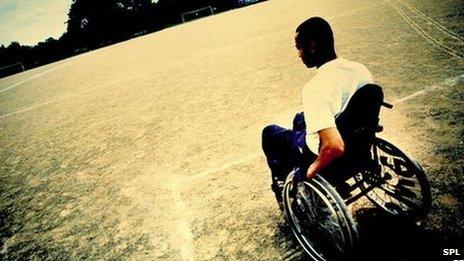Disability welfare changes delayed by assessment process
- Published
- comments

The government said the process of reassessing people was taking longer than planned
Disability welfare changes for England, Scotland and Wales have been delayed because the government has been unable to assess claimants in time.
Personal Independence Payments will replace Disability Living Allowance next week only for claimants in certain areas rather than across Britain.
Ministers said assessments were taking longer than expected and the scheme would now be phased in more gradually.
Labour's Rachel Reeves said it showed there was "chaos" in the department.
Over the next few years the government is moving around 3.3 million Disability Living Allowance (DLA) claimants, aged 16-64, to the new benefit - the Personal Independence Payment (PIP).
DLA - worth between £21 and £134.40 a week - is available to disabled people who have difficulty walking or need help to look after themselves.
Under the PIP system, which introduces regular written and face-to-face medical assessments, claimants will receive a daily living component of either £53 or £79.15 and a mobility component of either £21 or £55.25.
The Department of Work and Pensions (DWP) says the new system will be simpler and fairer and is essential to control costs to the taxpayer, which have risen to £13bn a year since DLA was introduced in 1992.
But charities and campaigners have argued it is unfair that millions of vulnerable people face a long period of anxiety while they wait to be reassessed and to find out if their benefits will be cut or withdrawn.
By 2018, 450,000 people will be ineligible for PIPs, while 780,000 will receive the same as or more than they previously did, according to the DWP.
Change in circumstances
Care Minister Norman Lamb: "It is best to pause and get it right, rather than rushing on"
The vast majority of disabled claimants will continue to claim DLA until 2015, after which point they will be sent information about reapplying for PIP.
But since June this year, all new disabled claimants have had to apply for PIP, and all current claimants whose circumstances have changed had been due to start moving to the new benefit on Monday.
The change to the reform timetable means only those in Wales, the East and West Midlands and East Anglia will transfer to Personal Independence Payment (PIP) from Monday if their condition changes.
The government said the need for the alteration had only came to light at the beginning of October.
The Department for Work and Pensions said Labour's claim of chaos over the changes was "wrong".
A spokesman said ministers had deliberately chosen a phased introduction for PIP claim reassessments so the system could be regularly reviewed.
"Our latest analysis, which is now beginning to benefit from more meaningful data, is telling us that the end-to-end claiming process is taking longer than expected," the spokesman added.
The adjustment to the timetable will not affect people in Northern Ireland.
Vulnerable people
Ms Reeves, shadow work and pensions secretary, said PIP followed the government's Work Programme and Universal Credit schemes in being beset by difficulties.
She said: "The delivery problems we are seeing at the Department for Work and Pensions now risk descending into farce. But for thousands of disabled people who are already extremely anxious about the changes, this is no joke.
"Not only is David Cameron's government out of touch but it's increasingly incompetent."
Labour's Rachel Reeves said the changes would cause "huge anxiety" for recipients
Work and Pensions Select Committee chair Dame Anne Begg, meanwhile, said delay in itself was "not a bad thing".
"I'd rather that we get it right because very often the people we're dealing with in the reform of the welfare system are people who are very vulnerable, who find it quite difficult to navigate their way through the system," the Labour MP for Aberdeen South told BBC Radio 4's Today programme.
"But, at the same time, the constant delays are also causing anxiety.
"People know that it's coming but they never know quite when they're going to be called in for a reassessment and exactly what the outcomes are going to be."
Disability charity Scope said the move was just a "tweak" and that it still believed the whole reassessment process was "too blunt an instrument".
The changes to disability benefits are part of an overhaul of the benefits system, which will see a string of working-age benefits merged into a single payment called Universal Credit.
- Published3 October 2013
- Published23 September 2013
- Published21 June 2013
- Published8 April 2013